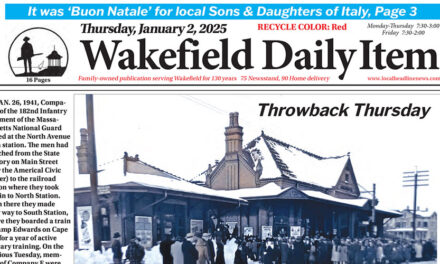By MARK SARDELLA
WAKEFIELD — Public participation at Town Council meetings may never be as freewheeling as British Parliament, but the rules may get somewhat less restrictive after the board adopts a revised public participation policy recommended by Town Counsel Thomas Mullen.
Mullen suggested changing the policy in light of a recent court case. He explained that in March, the Supreme Judicial Court held that a Board of Selectmen and its chairman could be held liable for enforcing its public comment policy prohibiting “rude” remarks.
The ruling stemmed from a civil case filed in Worcester Superior Court over an incident that took place at a meeting of the Southborough Board of Selectmen in December of 2018. In the case, plaintiff Louise Barron accused board Chairman Daniel Kolenda of violating her rights by chastising her and shutting down the meeting while she was trying to speak during the public participation segment. Kolenda also threatened to eject Barron from the meeting.
Kolenda’s actions took place in the course of a testy exchange during which Barron twice referred to Kolenda as “Hitler.”
The court held that such speech was allowed, Mullen said, and that the chairman’s response crossed the line.
The court invalidated the Southborough board’s public participation policy, which required that “all parties (including members of the presiding board) act in a professional and courteous manner when either addressing the board, or in responding to the public.”
Mullen said that his advice to the Town Council would be that they should not allow public comment at all at their meetings. Public participation is not required by law and the public has no right to speak unless the board is holding an official public hearing, Mullen said, such as one for a liquor license application or tax classification.
Mullen added that, since he knew the board would reject his recommendation to eliminate all public comment at their meetings, the next best advice he could give would be for the board to adjust its public participation policy to fit the standards outlined in the court case.
Specifically, Mullen recommended removing the following language from the policy: “Abusive, defamatory or remarks deemed by the chair as personal in nature will not be tolerated. Nor will discussion of personnel matters affecting individual employees or collective bargaining issues be permitted during the public participation segment. These actions will be ruled out of order. Persons engaged in such conduct will forfeit their remaining time, or, if necessary, be ejected from the meeting.”
Mullen said that he didn’t think the court would uphold the chair ejecting a speaker due to abusive or personal remarks. Mullen explained that the court held that discourteous, rude, disrespectful or personal speech about government officials is protected by the state Constitution. However, the town may set reasonable time, place and manner restrictions and may insist that “Persons who choose to speak must behave in a peaceful and orderly manner.”
Mullen recommended replacing the deleted language from the Town Council’s policy with that last sentence, “Persons who choose to speak must behave in a peaceful and orderly manner,” reflecting the language approved by the court decision.
Town Council members agreed to the change but decided to wait and vote at their next meeting to allow Mullen to make the changes and present a “clean” copy of the policy for the Council to review and vote on.





